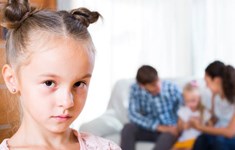Search Results

Child And Teen Development
A relatively short session approaching 'normal development' from a parent/carer's perspective and pointing towards the Core MindEd sessions on an Introduction to child development.

Primary School Children
This session introduces the range of behaviours to look for when parents wonder whether they should worry about their child's behaviour. It comes from the point of view of the parent who is wondering whether what they are trying to manage is different from other parents. It includes advice about comparing their child with other children of the same age etc. It also includes advice on when to be concerned about a child’s emotional state.

Children Under Five
This session introduces the range of behaviours to look for when parents wonder whether they should worry about their child's behaviour. It comes from the point of view of the parent who is wondering whether what they are trying to manage is different from other parents. It includes advice about comparing their child with other children of the same age etc. It also includes advice on when to be concerned about a child’s emotional state.

Secondary School Children
This session introduces the range of behaviours to look for when parents wonder whether they should worry about their child's behaviour. It comes from the point of view of the parent who is wondering whether what they are trying to manage is different from other parents. It includes advice about comparing their child with other children of the same age etc. It also includes advice on when to be concerned about a child’s emotional state.

Talking To My Child
This session provides parents with practical tips on how to talk to children and young people about difficult topics such as emotional difficulties, peer and family relationships and behavioural problems. The session helps parents to think about their particular child’s level of ability, their preferred style of interacting, and how best to get ‘alongside’ their child to share a problem.

Parenting A Child With Issues
This session is aimed at parents/carers of children whose behaviour challenges, or who have significant emoitional and behavioural issues. it considers: Life before diagnosis - · what to do if your child doesn’t accept your help · How to support your child if: hearing voices, delusional thoughts, not eating, having manic episodes, being violent – some of these will signpost other resources · How to get a diagnosis - this will be signpost other resources Life after diagnosis – · how to persuade your child to take medication/talk to therapist · Rights and responsibilities of parents · Planning for the future · Effectively supporting siblings/top tips · How to recognise trigger points – ie if CYP behaviour is cyclical (eg depression, psychosis) how to best anticipate. · How to talk to CYP about their diagnosis · Finding positives in your child's behaviour · How to talk to friends/family about your child's diagnosis · I have been referred to a parenting programme – what does this mean?

Child Sexual Abuse And Exploitation
This session gives parents/carers advice and information about child sexual abuse and exploitation.

Tips To Help You Support Your Child
This session builds on the real life experiences and understanding of parents and carers in dealing with the mental health challenges of their children and families, including themselves. It aims to provide simple, helpful, tips and advice that will help all parents/carers in practical ways.

Tips On Your Child's Condition
This session builds on the real life experiences and understanding of parents and carers in dealing with the mental health challenges of their children and families, including themselves. It aims to provide simple, helpful, tips and advice that will help all parents/carers in practical ways.

Speaking Up For Your Child
This session is aimed at parents and carers and covers supporting a child and parent / carer rights during treatment. It also covers what to do if there is a change of therapist, or if a child refuses to see their therapist, being effectively assertive, getting a school / GP to take seriously a 'below the radar child', and complaining effectively. It also touches on the use of diaries to collect evidence to present to a therapist, school or tribunal etc.
